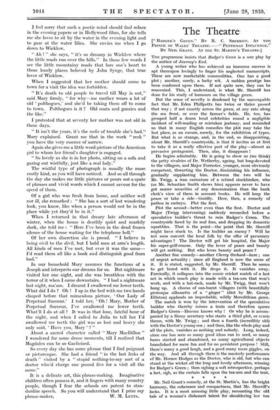The Theatre
r BADGER'S GREEN." BY R. C. SHERRIFF. AT THE PRINCE . OF WALES' THEATRE.-" PETTICOAT INFLUENCE.'' BY NEIL GRA.NT. AT THE ST. MARTIN'S THEATRE.] THE programme insists that Badger's Green is a new play by the author of Journey's End.
A young writer who has achieved an immense success is apt thereupon lovingly to finger his neglected manuscripts. These are now marketable commodities. One has a good plot ; another, surely, a lucky wit. A sudden prestige has been conferred upon them. If not quite new, they can be renovated. This,. I understand, is what Mr. Sherriff has done for his study of humours on the village green.
But the sense of novelty is deadened by the unescapable
fact that Mr. Eden Phillpotts has twice or thrice passed that way ; if not exactly across the green, at any rate along the sea front, or over the farmer's fields. He, too, has grouped half a dozen local celebrities round a negligible incident of will-reading or mistaken jealousy, and reminded us that in many English comedies the plot may take the last place, as an excuse, merely, for the exhibition of types. But what is so strange, and, in the end, so disappointing, about Mr. Sherriff s countryside, is that it invites us at first to take it as a really effective part of the play—almost as pervasive protagonist. Then, alas, it disappears !
He begins admirably. He is going to show us (we think) the petty rivalries of Dr. Wetherby, ageing, but long-devoted to the villagers, and Major Forrester, younger, more obviously competent, thwarting the Doctor, diminishing his influence, gradually supplanting him. Between the two will be Mr. Twigg, a wan caricature of a retired stockbroker, who (as Mr. Sebastian Smith shows him) appears never to have got nearer securities of any denomination than the bank clerk's view of them in account books. He will keep the peace or take a side—timidly. Here, then, a comedy of pathos in embryo. Plot the first.
Plot the second—better even than the first. Doctor and Major (Twigg intervening) suddenly reconciled before a speculative builder's threat to ruin Badger's Green. The countryside faced by its real foes, and dropping its domestic squabbles. That is the point—the point that Mr. Sherriff might have stuck to. Is the builder an enemy ? Will he not soon convert the local folk by the offer of pecuniary advantages ? The Doctor will get his hospital, the Major his super-golf-course. Only the lover of peace and beauty will get nothing. But who loves beauty and peace ?
Another fine comedy—another Cherry Orchard—here; one
of urgent actuality ; since all England is now the scene of it. It is stated, suggested, by Mr. Sherriff. Then he seems to get bored with it. He drops it. It vanishes away. Farcically, it collapses into the comic cricket match of a last act in which much play is made with a tea-urn that won't work, and with a hat-rack, made by Mr. Twigg, that won't hang up. A chorus of sun-burnt villagers (with beautifully grotesque silhouette of a " ginger " idiot by Mr. George Elliston) applauds an improbable, wildly Meredithian game.
The match is won by the intervention of the speculative builder who thereby misses a train and therefore spares Badger's Green—Heaven knows why ! Or why he is accom- panied by a flimsy secretary who starts a third plot, or comic theme, with Mr. Twigg ; and then a fourth (incredibly old) with the Doctor's young son ; and then, like the whole play and all the plots, vanishes as nothing and nobody. Long, indeed, since one has seen so many good ideas run to seed, so many hares started and abandoned, so many agricultural objects brandished for mere fun and for no persistent purpose ! Still, there's many a good laugh, and a good many more giggles, on the way. And all through there is the masterly performande of Mr. Horace Hodges as the Doctor, who is old, but who can stand at the wicket all the long and lovely afternoon, winning for Badger's Green ; then sighing a soft retrospective, perhaps a last, sigh, as the curtain falls upon the tea-urn and the tent.
* * * *


















































 Previous page
Previous page